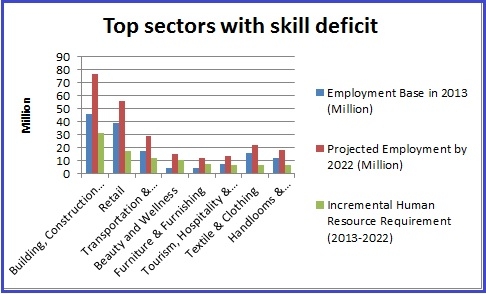From Dec 27, 2018 onwards, the National Skills Qualifications Framework will be mandatory for all central government and central government- owned PSU jobs
Rajiv Pratap Rudy, minister of state (independent charge) for skill development and entrepreneurship, said in an official statement that the recruitment rules of the Government of India and PSUs of the Central Government shall be amended to define the eligibility criteria for all positions in terms of NSQF levels.
National Skills Qualifications Framework (NSQF) is a competency-based framework that organises all qualifications according to a series of levels of knowledge, skills and aptitude.
The state governments and their PSUs shall also be encouraged to amend their recruitment rules on the above lines.
The minister said, after 27 December, 2018 it shall be mandatory for all training/educational programmes/courses to be NSQF compliant.
All training and educational institutions shall define eligibility criteria for admission to various courses in terms of NSQF levels.
From 27 December, 2016 onwards, government funding would not be available for any training or educational programmes or courses which are not NSQF-compliant.
Besides, the Indian job market will require an additional 109 million skilled workforce in the decade of 2012–22. An additional 460 million people will require upskilling or reskilling.
This was revealed by the NSDC report to be released on Monday, which identifies the skill gap across sectors and geographies.
Commenting on the study, Rudy referred to the old adage, ‘what cannot be measured, cannot be corrected.’
He said, “The objective behind the study is to identify the sectors that are likely to face the biggest gaps.”
He added, “It is imperative for us to plan the skilling of the future workforce of India on the basis of these reports.”
The report was released for 24 sectors, but 80 per cent of the skill gap is from the 10 sectors which include building, construction and real estate, retail, transportation and logistics, beauty and wellness, furniture and furnishing, tourism, hospitality and travel, textile and clothing, handlooms and handicrafts.
In fact, real estate, retail and logistics alone will need an additional 60 million skilled workers.
Rudy said that this endeavour was in line with PM Narendra Modi’s vision of making India the skill capital of the world.
The Minister said, these reports will be used for the implementation of the recently announced Pradhan Mantri Kaushal Vikas Yojana (PMKVY); for State Skill Missions, and for various other skill initiatives being planned across the country.
Sunil Arora, secretary, Ministry of Skill Development and Entrepreneurship said, “there is a changing paradigm in skill training towards demand-driven training to ensure employability and placement of the youth”. While the reports give an insight on the quantitative side of human resource requirement in each of the sectors, the research has also led to useful qualitative findings in terms of highlighting key job roles and existing skill gaps in the sectors, key interventions required to map supply and demand, etc.
More than 1000 industry experts, 19 Sector Skill Councils, 110 training institutions and over 1500 trainees have been engaged for the studies.
Value our content... contribute towards our growth. Even a small contribution a month would be of great help for us.
Since eight years, we have been serving the industry through daily news and stories. Our content is free for all and we plan to keep it that way.
Support HRKatha. Pay Here (All it takes is a minute)




































